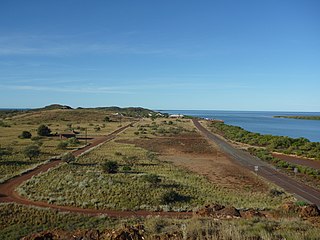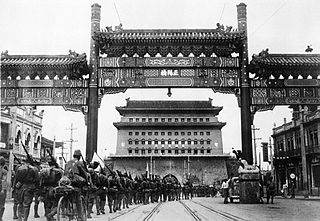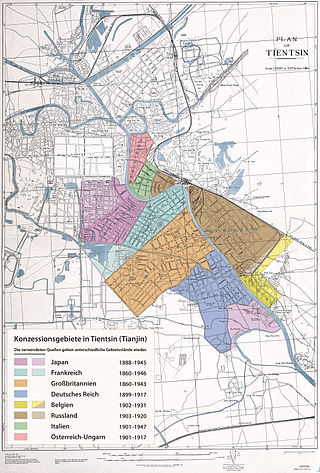
Tianjin, alternately romanized as Tientsin, is a municipality and a coastal metropolis in Northern China on the shore of the Bohai Sea. It is one of the nine national central cities in Mainland China, with a total population of 13,866,009 inhabitants during the 2020 Chinese census. Its built-up area, made up of 12 central districts, was home to 11,165,706 inhabitants and is also the world's 29th-largest agglomeration and 11th-most populous city proper.
Port Arthur may refer to:

The Treaty of Tientsin, also known as the Treaty of Tianjin, is a collective name for several documents signed at Tianjin in June 1858. The Qing dynasty, Russian Empire, Second French Empire, United Kingdom, and the United States were the parties involved. These treaties, counted by the Chinese among the so-called unequal treaties, opened more Chinese ports to foreign trade, permitted foreign legations in the Chinese capital Beijing, allowed Christian missionary activity, and effectively legalized the import of opium. They ended the first phase of the Second Opium War, which had begun in 1856 and were ratified by the Emperor of China in the Convention of Peking in 1860, after the end of the war.

Cossack, known as Bajinhurrba in Ngarluma language, and formerly known as Tien Tsin, is an historic ghost town located 1,480 km (920 mi) north of Perth and 15 km (9.3 mi) from Roebourne in the Pilbara region of Western Australia. The nearest town to Cossack, which is located on Butcher Inlet at the mouth of the Harding River, is Wickham. The former Tien Tsin Harbour is now known as Port Walcott. Since 2021, the townsite is managed and operated by the Ngarluma and Yindjibarndi Foundation Ltd (NYFL).

The Battle of Beiping–Tianjin, also known as the Battle of Beiping, Battle of Peiping, Battle of Beijing, Battle of Peiking, the Peiking–Tientsin Operation, and by the Japanese as the North China Incident was a series of battles of the Second Sino-Japanese War fought in the proximity of Beiping and Tianjin. It resulted in a Japanese victory.
In international relations, a concession is a "synallagmatic act by which a State transfers the exercise of rights or functions proper to itself to a foreign private test which, in turn, participates in the performance of public functions and thus gains a privileged position vis-a-vis other private law subjects within the jurisdiction of the State concerned." International concessions are not defined in international law and do not generally fall under it. Rather, they are governed by the municipal law of the conceding state. There may, however, be a law of succession for such concessions, whereby the concession is continued even when the conceding state ceases to exist.

The foreign concessions in Tianjin were concession territories ceded by Qing China to a number of European countries, the United States and Japan within the city of Tianjin. There were altogether nine foreign concessions in old Tianjin on the eve of World War II. These concessions also contributed to the rapid development of Tianjin from the early to mid-20th century. The first foreign concessions in Tianjin were granted in 1860. By 1943, all the foreign concessions, except the Japanese concession, had ceased to exist de facto.
The Tientsin Massacre, was an attack on Christian missionaries and converts in the late 19th century during the late Qing dynasty. 60 people died in attacks on French Catholic priests and nuns. There was intense belligerence from French diplomats, and armed foreign intervention in Tianjin (Tientsin) in 1870. The incident nearly precipitated a war and marked an end to relative cooperation between foreign powers and the Tongzhi court, and adversely affected the ongoing renegotiation of the Treaties of Tientsin, first signed in 1858. French Catholic missionaries were active in China; they were funded by appeals in French churches. The Holy Childhood Association was a Catholic charity founded in 1843 to rescue Chinese children from infanticide. It was a target of Chinese anti-Christian protests led by the local gentry who saw the need to defend Confucianism. Rioting sparked by false rumors of the killing of babies led to the death of a French consul and provoked a diplomatic crisis.

Concessions in China were a group of concessions that existed during the late Imperial China and the Republic of China, which were governed and occupied by foreign powers, and are frequently associated with colonialism and imperialism.
Arrival of Tongkin Train, also referred to as Arrival of Train, Tien-Tsin, is a 1901 documentary silent film showing the arrival of a train in Tianjin, China. The film was made by American Mutoscope and Biograph Company.

The Battle of Tientsin, or the Relief of Tientsin, occurred on 13–14 July 1900, during the Boxer Rebellion in Northern China. A multinational military force, representing the Eight-Nation Alliance, rescued a besieged population of foreign nationals in the city of Tientsin by defeating the Chinese Imperial army and Boxers. The capture of Tientsin gave the Eight-Nation Alliance a base to launch a rescue mission for the foreign nationals besieged in the Legation Quarter of Beijing and to capture Beijing in the Battle of Peking (1900).
Hebei University is a provincial public university in Baoding, Hebei, China.

Tien Chu Ve-Tsin Chemical Limited is a Chinese manufacturer of honey by-products, food chemicals and additives including monosodium glutamate or MSG.

Tianjin cuisine, also known as Jin cuisine, refers to the native cooking styles of Tianjin, the largest port city in Northern China. Though heavily influenced by Beijing cuisine, Tianjin cuisine differs by being more focused on seafood. It is categorized by its freshness, saltiness and soft and crispy textures. Cooking methods include grilling, simmering, sautéing and steaming. With more than 300 years of history, the development of the Tianjin cuisine was highly dependent on the diet of boatmen and the salt trades due to its geographical location. Tianjin Food Street is a place where cross-cultural Chinese dishes may be found. Popular dishes include Eight Great Bowls, Four Great Stews, Tianjing goubuli, and Four Winter Delicacies, among others. Eight Great Bowls is a combination of eight different meat dishes. The Four Great Stews refers to a very large number of stews, including chicken, duck, seafood, beef, and mutton. Tianjin also has several famous snack items. Goubuli (狗不理包子) is a classic steamed stuffed bun (baozi) that is well-known throughout China. Guifaxiang (桂发祥麻花) is a traditional brand of mahua.

Robert John Sholl was a government administrator, magistrate, explorer, journalist, entrepreneur, harbourmaster, customs official, postmaster and lay reader in Western Australia (WA), during the colonial era. Because of his multiple, simultaneous roles, which carried judicial, political, cultural and commercial power and influence, Sholl is regarded as a significant figure in the history of North-West Australia, at an early stage of its settlement by Europeans.
Port Walcott, formerly known as Tien Tsin Harbour, is a large open water harbour located on the northwest coast of Western Australia, located near the town of Point Samson.
Mount Welcome Station is a pastoral lease that once operated as a sheep station but is now operated as a cattle station in Western Australia.

Zhang Xueming was a Chinese soldier and politician. He served as the mayor of Tianjin in 1931, during the Japanese invasion of Manchuria, before being forced into exile. After the Second World War, Zhang defected from the Kuomintang and joined the Communist forces during the Chinese Civil War.

The Musée Hoangho Paiho was a museum of natural history and fossils founded by the French Jesuit Émile Licent (1876–1952) in Tianjin, China, in 1914. Also known as the Beijiang Museum, it is now part of the Tianjin Natural History Museum.
Tianjin Museum of Modern History (TMM) is located at No. 314 Hebei Road, in Heping District, Tianjin, the so-called “Five Great Avenues” area (a community of Western-style villas). TMM is mainly engaged in the study of the history of interactions between Tianjin and the West from the mid-16th century to the mid-20th century. It has made great efforts to preserve the cultural heritages of the former nine concessions in Tianjin. In the museum, a great number of old historical photos and objects collected from all over the world are exhibited, many of which are not available elsewhere in China and have great research value.











